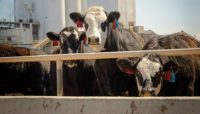A significant part of the belief system throughout JBS S.A., according to Wesley Batista, president and CEO of JBS S.A.’s global operations, is that hard work always makes the difference — that miracles do not occur in the meat and poultry business.
| Do you think JBS USA deserves to be the 2014 Plant of the Year? Vote for them in the National Provisioner 2014 Plant of the Year poll! |
Certainly, the management team credits hard work, perseverance and a change in the plant culture as the primary catalysts to that sea change, but it did not expect such a quick turnaround in the number.
Today, the Marshalltown plant boasts a wide variety of state-of-the-art improvements — from operations to employee welfare, from a brand new distribution center to a brand new, positive perception from the local community, and from a bevy of value-added products to heightened quality assurance for all products it produces.
All this emanated from the single act of JBS S.A. purchasing Swift & Company in 2007, seeing opportunity in a significantly large business whose growth potential had been hindered.
A change agent
Four and a half years ago, when JBS brought in Troy Mulgrew to be the general manager, Batista told Mulgrew, through an interpreter at the time, “Give that plant tender, loving care and the people will take care of you.” Mulgrew was tasked with changing the culture of the plant, and says that Batista’s advice eventually proved true.
“How do you change the culture of a plant? How do you start changing the way 2,400 people think, a changing workforce out there with a lot of turnover?” Mulgrew asks. “You simply can’t stop — it has to be this relentless, high-energy, consistent message in every walk and every talk that you do.”
Mulgrew credits his team for the successful transition, calling it “the best plant-management team, best production team and best senior-management team I have worked with in the last 30 years.
“[The team members] have great depth,” he adds. “They have a vision; they want to be the best; and they’re relentless here.”
Among the first signs to Marshalltown employees that their needs mattered was the approval for a sorely needed, complete overhaul of the employee welfare areas.
“Our locker rooms and restrooms were in very poor shape: old, rusted lockers; a lot of graffiti,” Mulgrew says. “We gutted all of them and … probably spent $3.5 million or $4 million dollars on new facilities there. Our payback on that investment comes from our turnover rate, which has plummeted more than 70 percent.
We call that nothing short of a miracle.”
Another indirect return on the investment in its workforce comes in the form of worker safety — and at the time of The National Provisioner’s visit, Marshalltown had surpassed three-million consecutive man hours worked without a recordable lost-time incident, an achievement Mulgrew says is a far cry from where it was years ago before these investments were made.
Improve operations, improve quality
To say JBS USA has invested significantly in Marshalltown over the years is not hyperbole, and may even be an understatement. It didn’t take JBS very long to reverse seven years of previous stagnation in capital expenditures, and now Marshalltown is a gem of a facility, says Batista.
“The catch-up period has been done; now we are ahead,” he states. “When you see Marshalltown, you see a first-in-class facility.”
From the kill floor to logistics, JBS USA has approved a variety of installations and improvements at Marshalltown, all in an attempt to protect the animals and the workforce, as well as the quality of the products, and to give those products a value advantage in the marketplace.
A new barn setup and a CO2 stunning system were installed to improve the facility’s ability to protect animal welfare. Moving on to first-processing, Marshalltown was able to drive up its hog-splitting accuracy after it installed an automated splitter — from an 80 percent success rate to 95 percent.
“It provides an ergonomic improvement, a safety improvement and a labor improvement, because those folks are now doing another job for us,” Mulgrew says. “Finally, it provides a yield improvement as well.”
Mulgrew says the company also made significant investments in its cut floor operations. These investments have added value via the consistency and variety of grades Marshalltown is able to offer customers.
The Marshalltown belly-trimming process allows each pork belly to be trimmed with accuracy and consistency to meet customer specifications. The Marshalltown rib line process allows each rib to be individually cut to the same specifications every time and efficiently conveyed to the new variable retention time (VRT) freezer within minutes of the cutting and packaging process.
Marshalltown has been able to add value to its trim as well, having installed an X-ray fat-analysis and automated trim-blending system in the facility. Mulgrew says the trim blends Marshalltown sells to customers are much closer to specifications than they ever were before, and the number of foreign-material issues has dramatically decreased as well.
In January 2012, Marshalltown’s state-of-the-art distribution center and VRT freezer opened, consolidating the plant’s logistics needs into one on-site facility.
Mulgrew explains that, because the DC is connected to the plant by an enclosed, climate-controlled bridge (with conveyors carrying cartons of product to the sorting facility and on to coolers and freezers), Marshalltown has been able to cut its product-damage claims down significantly. From the time product is placed into cartons for shipping until it is manually stacked in rail cars at the DC, there is no need for any employee to handle any product carton. The sorting, storing and transfer of product in and around the DC and VRT are all fully automated.








Report Abusive Comment